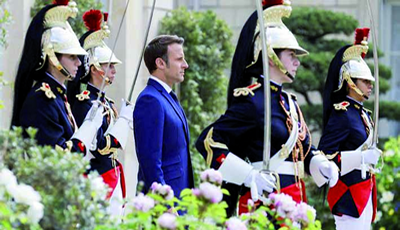French President Emmanuel Macron promised to act for a “liveable planet” and “a livelier and stronger France” when he is sworn in for a second term a few days later during a highly symbolic but simple ceremony.
“I am aware of the seriousness of the period,” Macron announced at the start of a speech in the Elysée ballroom, in front of an audience of around 450 guests, evoking, like the President of the Constitutional Council, Laurent Fabius, to the war in Ukraine, the Covid-19 epidemic and the climate emergency.
Macron stressed the need “to move forward relentlessly” for France and Europe, and “to build a new European peace and a new independence on our continent”.
The inauguration ceremony was simple, similar to the inauguration ceremonies of the two previous presidents who won a second term, François Mitterrand and Jacques Chirac.
Participants included Macron’s predecessor Nicolas Sarkozy and Francois Hollande, as well as members of his family, led by his wife Brigitte, his friends, members of the government, current Prime Minister Jean Castix and former Edouard Philippe , as well as senior civil servants from both Houses of Parliament, representatives of universities, trade unions, religions and others.
Macron welcomed the guests, including health care providers, local elected officials, association leaders, sportsmen and young people who embody the priorities he will work on during his new term.
Also present were relatives of Samuel Baty, the teacher beheaded by a jihadist in an attack in October 2020, and the widow of the first doctor who died of Covid-19.
Macron, a liberal centrist re-elected with 58.55% of the vote on April 24, called for “inventing a new approach, far from conventions and banal scenarios” to exercise governance by “planning, reforming and involving” French citizens more. .
His predecessor, socialist Francois Macron, said he was pleased with Macron’s “recognition” of the need for change in his exercise of power, telling reporters that “yesterday’s methods cannot be repeated for tomorrow’s stage, not only because they will be very difficult, but also because France is very divided. »
The new term officially begins on May 14. The appointment of a new Prime Minister comes after this date, while the legislative elections take place a month later.
The apparent difficulties in finding the ideal person to lead the new government have sparked speculation, even if the Elysée has confirmed that “the president has not offered the post of prime minister to anyone”.
In this context, it has been reported that Véronique Bedag, chief of staff of former Prime Minister Emmanuel Valls, and currently managing director of the real estate group “Nexity”, rejected the offer, as well as the socialist deputy Valérie Rabo, who said she had been contacted, but refused, so as not to have to work on a plan to raise the retirement age to 65.
French historian Jean Garrig expected a series of difficulties for Macron in this regard.
He mentions in particular the “fragmented political scene” with which he is confronted “without a real partisan culture” within his movement, now known as the Ennahda party, and “the nature of its political positioning on the right and on the left in same time. »
He concluded: “It is not possible to create a party called Al-Nahda and appoint former personalities to head the government.”
On Sunday, Macron will take part in a ceremony commemorating the Allied victory over Nazi Germany on May 8, 1945.
On Monday, he will travel to Strasbourg on Europe Day to deliver a speech at the European Parliament before traveling to Berlin to meet German Chancellor Olaf Scholz in his first visit abroad since his re-election. .
–


